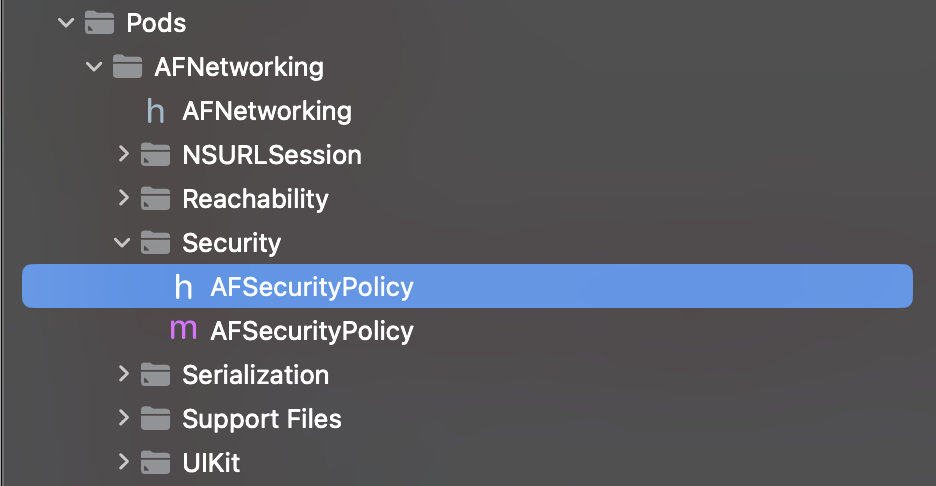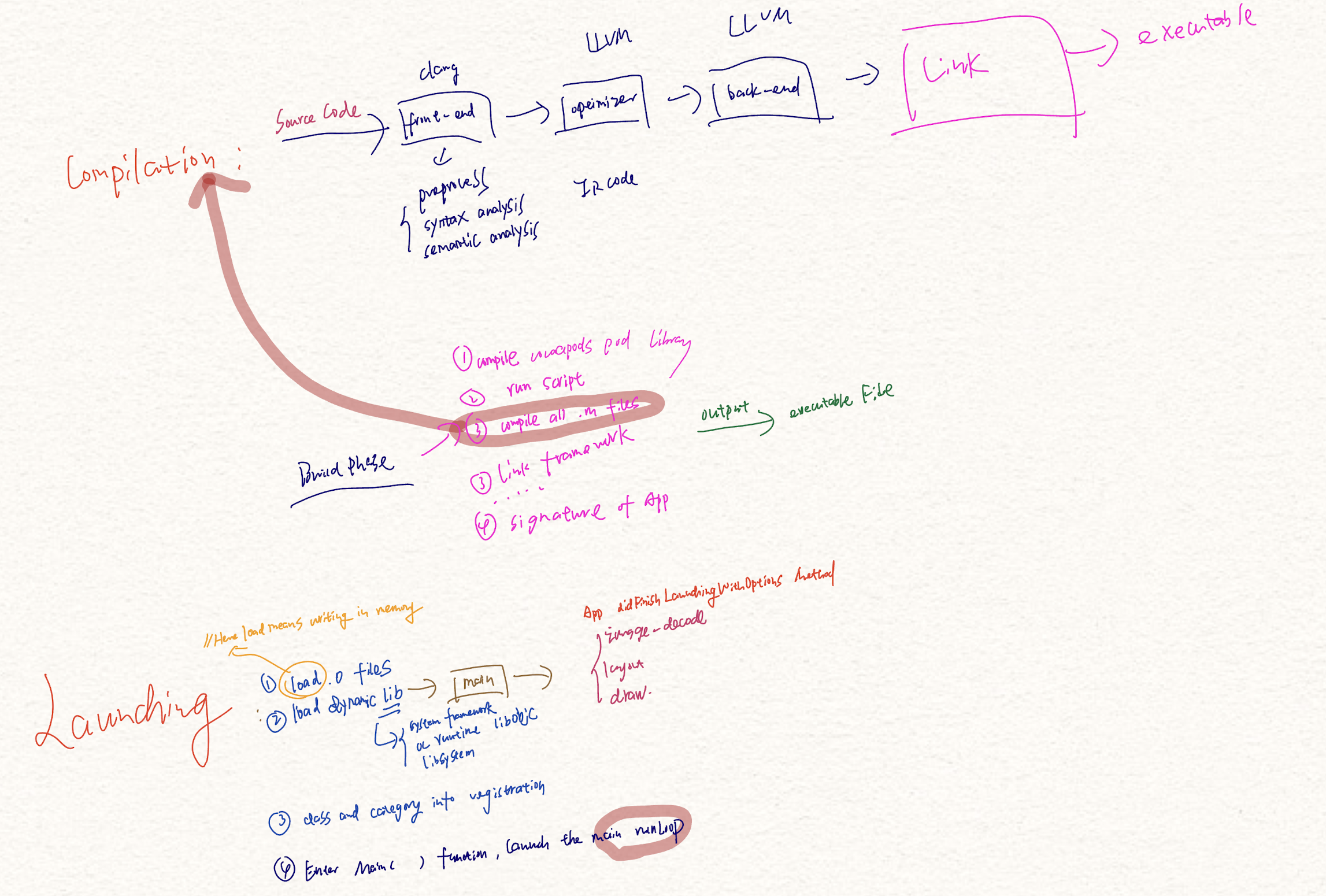Cocopods
1)How does Cocopods work?
For example, here is a pod file:
// Podfile
pod 'AFNetworking', :git => 'https://ririripley/AFNetworking.git', :tag => '3.2.1'
1.1)According to :git => ‘git@gitlab.xxx.net:ios-thirdpartservice/xxxreact.git’, locate the corresponding repo.
1.2)According to :tag => ‘1.0.0’, locate the correpsonding commit.
1.3)Find the .podspec file in the corresponding commit:
Pod::Spec.new do |s|
s.name = 'AFNetworking'
s.version = '3.2.1'
s.license = 'MIT'
s.summary = 'A delightful iOS and OS X networking framework.'
s.homepage = 'https://github.com/AFNetworking/AFNetworking'
s.social_media_url = 'https://twitter.com/AFNetworking'
s.authors = { 'Mattt Thompson' => 'm@mattt.me' }
s.source = { :git => 'https://github.com/AFNetworking/AFNetworking.git', :tag => s.version, :submodules => true }
s.requires_arc = true
s.public_header_files = 'AFNetworking/AFNetworking.h'
s.source_files = 'AFNetworking/AFNetworking.h'
pch_AF = <<-EOS
#ifndef TARGET_OS_IOS
#define TARGET_OS_IOS TARGET_OS_IPHONE
#endif
#ifndef TARGET_OS_WATCH
#define TARGET_OS_WATCH 0
#endif
#ifndef TARGET_OS_TV
#define TARGET_OS_TV 0
#endif
EOS
s.prefix_header_contents = pch_AF
s.ios.deployment_target = '7.0'
s.osx.deployment_target = '10.9'
s.watchos.deployment_target = '2.0'
s.tvos.deployment_target = '9.0'
s.subspec 'Security' do |ss|
ss.source_files = 'AFNetworking/AFSecurityPolicy.{h,m}'
ss.public_header_files = 'AFNetworking/AFSecurityPolicy.h'
ss.frameworks = 'Security'
end
end
1.4) Check whether s.name is the same as the one in podfile(both AFNetworking). If yes, then find the
files which need to be imported, in this case, ‘AFNetworking/AFNetworking.h’. As can be seen as follows, AFNetworking.h
as well as AFSecurityPolicy.h and AFSecurityPolicy.m is exposed in Pod dir.

1.5) Finally, your actual project pulls in the code through either pod install then the physical files get downloaded
to your mac and copied for your project under Pod dir.
2)Podsepc file
A specification describes a version of Pod library. It includes details about where the source should be fetched from which tag or commit or branch,
what files to use, the build settings to apply, and other general metadata such as its name, version, and description.
3)Subspecs
Subspecs describes the norms of submodule of a repo.
Pod::Spec.new do |spec|
spec.name = 'ShareKit'
spec.source_files = 'Classes/ShareKit/{Configuration,Core,Customize UI,UI}/**/*.{h,m,c}'
# ...
spec.subspec 'Evernote' do |evernote|
evernote.source_files = 'Classes/ShareKit/Sharers/Services/Evernote/**/*.{h,m}'
end
spec.subspec 'Facebook' do |facebook|
facebook.source_files = 'Classes/ShareKit/Sharers/Services/Facebook/**/*.{h,m}'
facebook.compiler_flags = '-Wno-incomplete-implementation -Wno-missing-prototypes'
facebook.dependency 'Facebook-iOS-SDK'
end
# ...
end
With the above example a Podfile using pod ‘ShareKit’ command results in the inclusion of the whole library,
while pod ‘ShareKit/Facebook’ command can be used if you are interested only in the Facebook specific parts in which
the part of subspec in the Podfile of shareKit works.
4)Podfile.lock & Manifest.lock
When pod install and pod update command is exectuted , cocoapods will generate a podfile.lock file, which records the version.
// Podfile.lock
PODS:
- AFNetworking (3.2.1):
- AFNetworking/NSURLSession (= 3.2.1)
- AFNetworking/Reachability (= 3.2.1)
- AFNetworking/Security (= 3.2.1)
- AFNetworking/Serialization (= 3.2.1)
- AFNetworking/UIKit (= 3.2.1)
- AFNetworking/NSURLSession (3.2.1):
- AFNetworking/Reachability
- AFNetworking/Security
- AFNetworking/Serialization
- AFNetworking/Reachability (3.2.1)
- AFNetworking/Security (3.2.1)
- AFNetworking/Serialization (3.2.1)
- AFNetworking/UIKit (3.2.1):
- AFNetworking/NSURLSession
DEPENDENCIES:
- AFNetworking (~> 3.2.1)
SPEC REPOS:
trunk:
- AFNetworking
SPEC CHECKSUMS:
AFNetworking: b6f891fdfaed196b46c7a83cf209e09697b94057
PODFILE CHECKSUM: 798ae8c2e51bc1cfec4a132a30b3bf5219febe9e
COCOAPODS: 1.11.3
When we execute the command pod install or pod update, cocoapods will generate a podfile.lock file, which record all the
modules in details. Then here comes the question, since we already have podfile, why do we still need podfile.lock for version control.
There are two reasons:
Firstly, we do not always specify exact versions of our pods, like : pod ‘A’.
Secondly, even though we do specify the version of A like pod ‘A’, ‘1.0.0’, it is hard to gurantee the dependency has all specified
the exact version. One typical example is if the pod A has a dependency on pod A2 — declared in A.podspec as dependency ‘A2’, ‘~> 3.0’.
(FYI, the ‘~> 3.0’ here means a version up to 4.0 (but not including 4.0 and higher))
In such case, using pod ‘A’, ‘1.0.0’ in your Podfile will indeed force user1 and user2 to both always use version 1.0.0 of the pod A, but:
user1 might end up with pod A2 in version 3.4 (because that was A2’s latest version at that time)
while when user2 runs pod install when joining the project later, they might get pod A2 in version 3.5
(because the maintainer of A2 might have released a new version in the meantime).
Therefore, we need podfile to guarantee the versions of all moduls in our pods dir. Since Pods dir is usually git ignored.
Manifest.lock is a copy of podfile.lock which is under the Pods dir. Every time we build the project, the script will check whether podfile.lock
is the same as Manifest.lock, if not, then you will see some warnings like this:
"error: The sandbox is not in sync with the Podfile.lock. Run 'pod install' or update your CocoaPods installation."
This mechanism is to remind the developer that the versions of local pods are not consistent with what the project specify which can help
to avoid problems causing by version inconsistency.
5)Difference between pod install & pod update & pod repo update
pod install
Every time the pod install command is run — and downloads and install new pods.
It writes the version it has installed, for each pods, in the Podfile.lock file. This file keeps track of the installed version
of each pod and locks those versions.
Conforming priority : podfile -> podlock
For example, if no exact version is specified for A in podfile, then it will install the specified version in podfile.lock of A.
If podfile specifies the version of A, then it will install the version even it is different from the one specified in podfile.lock.
pod update
When you run pod update PODNAME, CocoaPods will try to find an updated version of the pod PODNAME,
without taking into account the version listed in Podfile.lock.
It will update the pod to the latest version possible (as long as it matches the version restrictions in your Podfile).
If you run pod update with no pod name, CocoaPods will update every pod listed in your Podfile to the latest version possible.
After that, a brand new podfile.lock file is generated.
pod repo update
Updates the local clone of the spec-repo NAME.
If NAME is omitted this will update all spec-repos located at ~/.cocoapods/repos in your home folder.
So what is in ~/.cocoapods/repos, try to open it in your local pc, you will find that it copies the repo of
"https://github.com/CocoaPods/Specs/tree/master/Specs", which records all the podspec file of pod library.
In this way, cocoapods know how to download the corresponding pod library according to the information in
~/.cocoapods/repos.
Make Static And Dynamic Library
You can do step by step following this link:
https://blog.csdn.net/fallenink/article/details/53501969
Build Phase & Launching of An APP

Reference
https://www.jianshu.com/p/049dfb9c6274
https://cloud.tencent.com/developer/article/1458158
https://struggleblog.com/2021/05/19/podspec/
http://www.samirchen.com/about-podfile-lock/
https://guides.cocoapods.org/using/pod-install-vs-update.html
https://stackoverflow.com/questions/20213751/what-is-the-usage-of-in-cocoapods
https://blog.csdn.net/fallenink/article/details/53501969
https://juejin.cn/post/6859926544408969224